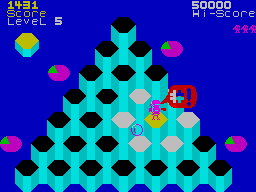
Brilliant graphics, swearing and balls — all part of the fun in Pogo.
Producer: Ocean
Memory required: 48K
Retail price: £5.90
Language: machine code
Author: Ronald Rhodes

Brilliant graphics, swearing and balls — all part of the fun in Pogo.
With a hop, skip and a jump, Pogo is what you might call a second generation ‘Painter’-type game. Actually it’s based on the arcade original ‘Q-Bert,’ and Ocean’s version looks excellent. Last month we reviewed Pi-Balled from Automata, and Pogo is very similar.
Resembling one of the crystal constructs from the opening sequences of Superman I, the Planet of Steps is the playground on which Pogo must survive. In effect it is a pyramid with 28 steps: hexagonal-shaped steps in 3D. The top surfaces of these steps have to be re-coloured to match the colour shown in a step at the top left of the screen. To do this Pogo must hop from step to step. When he lands on one it changes colour. He loses a life should he hop off the edges of the pyramid.
Unfortunately he has been pursued from his home planet by some enemies. These consist of glass balls, a snake called Hiss and a few scorpions. The glass balls drop on to the steps from the top and roll down, crushing anything in their path. The scorpions fly on from the sides and try to sting Pogo, whereas Hiss actually chases Pogo about. The best way to avoid the snake is to jump on to one of the flying saucers that linger beside the steps. Not only will this transport Pogo to the top of the pyramid again, it will lure the snake off the edge to is death for a while! It comes back soon enough.
Depending on the screen level, Pogo will have to change the colour of the steps once or twice. There are also a varying number of saucers, which may only be used once per screen. For the first four screens there is only one colour to change, and from screen 5 onwards, two. Bonus points are awarded for flying saucers not used. The inlay states that the pyramid contains 27 steps, which must be a misprint as there are actually 28.
‘A well-presented game with a very colourful loading screen and clear instructions. Pogo has the best 3D effect that I have seen on the Spectrum for this type of game. The graphics are excellent and very much like the arcade version — they are fast, smooth, well detailed and responsive, with superb use of colour. The sound, too, is exceptional. It’s a well thought out game which is very addictive and which I can certainly recommend.’
‘The characterful drawing of Pogo himself is quite enjoyable, and the detail of the others is well done. Pogo as a game is strongly coloured and the graphics are fast and smooth. It’s a simple game idea, and one that works well, is playable and addictive. My one complaint is that the keys are a bit of a stretch. The four directions are actually diagonals and Ocean have placed them at the extremities of the keyboard. I would have thought the end keys on the two bottom rows would have been a much better solution.’
‘Pogo is an extremely playable version of the arcade original with high-quality sound and graphics. It’s better than Pi-Balled on control with its excellent responses, but I think Pi-Balled has better looking flying saucers. Good control helps to make Pogo very playable and addictive and, all round, this is the best version I have seen.’
Control keys: 1=up/left, zero=up/right, CAPS SHIFT=down/left and BREAK=down/right
Joystick: good range with Protek, Kempston, ZX 2 on a select menu to which you return after each game
Keyboard play: highly responsive, although keys may be awkward for some
Use of colour: excellent
Graphics: very good
Sound: very good
Skill levels: 1
Lives: 4
Screens: 16
General rating: addictive, fun and very good value for money.
| Use of computer | 84% |
| Graphics | 84% |
| Playability | 89% |
| Getting started | 83% |
| Addictive qualities | 92% |
| Value for money | 92% |
| Overall | 87% |